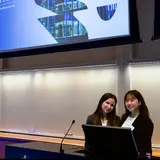Remarks by Prof. Shyam Sunder at Accounting Hall of Fame Induction
Shyam Sunder, the James L. Frank Professor of Accounting, Economics, and Finance, was inducted into the Accounting Hall of Fame at the annual American Accounting Association (AAA) meeting on August 11.
Shyam Sunder, the James L. Frank Professor of Accounting, Economics, and Finance, was inducted into the Accounting Hall of Fame at the annual American Accounting Association (AAA) meeting, held virtually on August 11. The following are his remarks at the induction.
I thank the American Accounting Association and the Ohio State University’s faculty founders of the Accounting Hall of Fame, especially Thomas J. Burns, for this honor. It is humbling to see this list of hundred that starts with legendary George O. May, William A. Paton and Henry Hatfield, and includes my mentors and colleagues (William W. Cooper, Sidney Davidson, Nicholas Dopuch, Yuji Ijiri, and Robert S. Kaplan), and many friends. I owe what I have learned to them, to my father who taught this sixth grader to keep his farm and business accounts, and to my wife Manjula.
In its varied forms, accounting developed to serve temples, treasuries and trade to build the foundations of human civilization in all parts of the world. Scholars have pointed out contributions of accounting to evolution of language, writing, mathematics, and sociology, and as an essential element of economics, finance and management. As revealed in pre-historic hash marks on cave walls to electronic computing, accounting co-evolved with symbol-processing ability, technologies, and usage to make humans a unique species.
Three centuries before Christ, Kautilya assembled the prevailing principles of accounting and auditing in his Sanskrit treatise Arthaśāstra on management and economics. He included (in Book II, Chapters 6-9) principles of management and internal controls as well as lists of checks auditors must make. More than two millenniums later, his analysis of the problems of accounting and auditing, and his suggested solutions remain germane.
Recent centuries have seen the creation of millions of religious, political, business, and non-governmental entities, many of them operating on an unprecedentedly large scale. Accounting lies at the heart of their organizing, operations, and achievements, as well as failures. Done well, accounting enables social cohesion and material prosperity; when hijacked to serve narrow self-interests, it becomes an instrument of disorder and decline.
Neither human nature, nor social and personal pursuit of material wealth has changed through the ages; nor is it likely to. The challenge of accounting is to enable, indeed encourage, individuals and groups to pursue their well-being, without letting them tear apart the social fabric of our mutual relationships and expectations that enabled us to come down from the trees.
This delicate balance calls for building the institutional structure of accounting in evolutionary steps chosen with wisdom and self-restraint. As a social system, accounting sets up an interminably complex set of interactions among environment, society, resources, desires, expectations, opportunities and innovation—all in constant flux. No person or group has the knowledge or wisdom to design an ideal accounting system de novo. Instead, it seems better to adjust our existing system in small steps to address the problems of management and practice, and to beta-test them in the field before implementing them as guidelines for good practice (which is the original meaning of generally accepted accounting principles or GAAP), and not as “standards” enforced by threat of penalties.
A more modest attitude to improving accounting and auditing, scaling back the assertive standards and mandates of the recent decades to allow more room for voluntary judgment and choice, may engender a greater sense of responsibility in managers, support a free-standing independent community of professionals as guardians of the accounting and control system, and serve as a basis for thoughtful scholarly and classroom analysis. It may also attract talented youth to serve society through modern technologies and better accounting.



